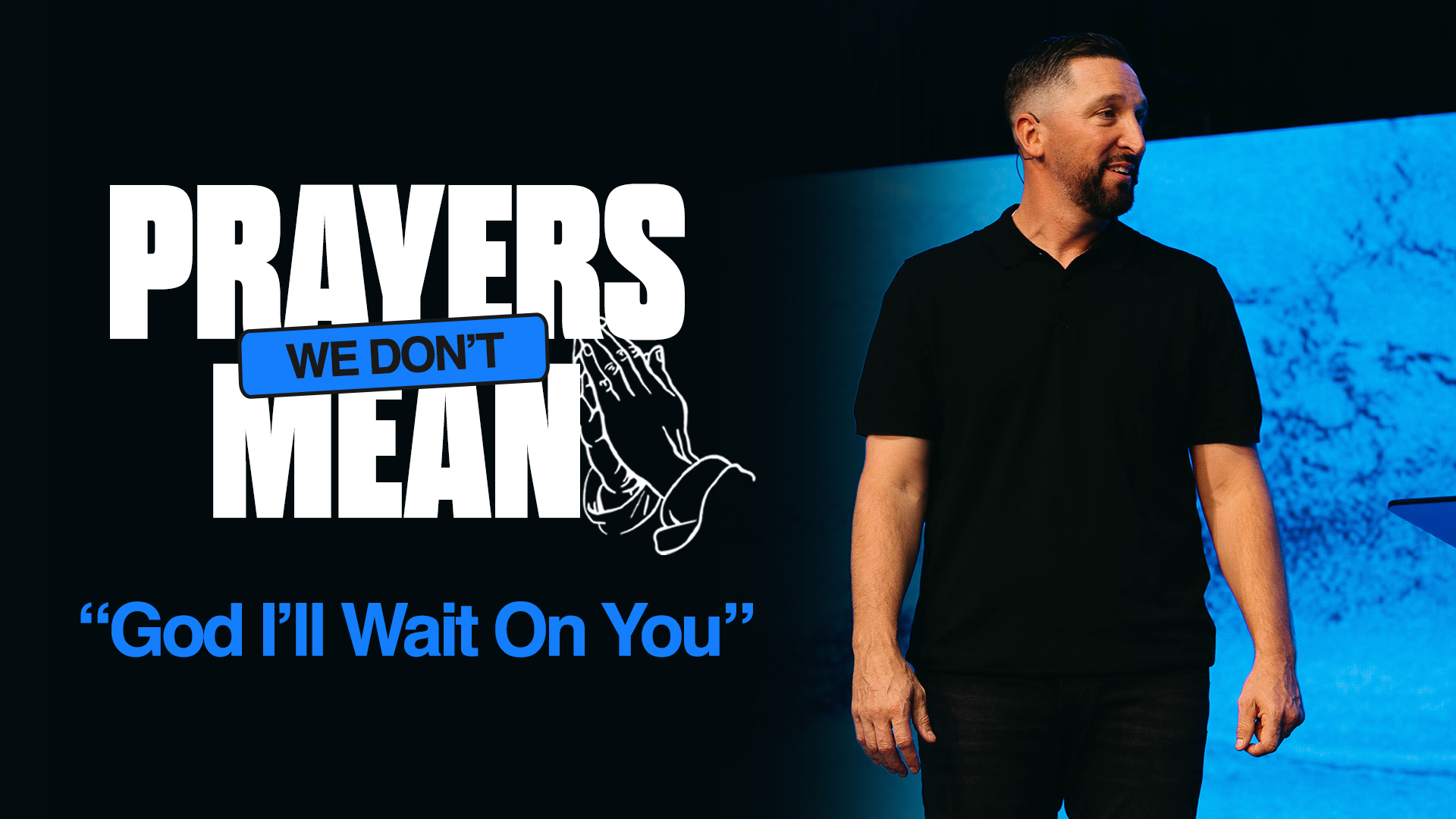
Prayers We Don’t Mean | Week 2
Prayers We Don’t Mean | “God I’ll Wait on You” | Steve DeFrain
“GOD I’ll WAIT ON YOU”
John 14…13 And I will do whatever you ask in my name, so that the Father may be glorified in the Son. 14 You may ask me for anything in my name, and I will do it.
GOD’S PLANS WITHOUT GOD’S TIMING ALWAYS LEADS TO DISASTER
The opposite of WAITING PATIENTLY is WORRYING PERSISTENTLY
Matthew 6…25 “Therefore I tell you, do not worry about your life, what you will eat or drink; or about your body, what you will wear. Is not life more than food, and the body more than clothes? 26 Look at the birds of the air; they do not sow or reap or store away in barns, and yet your heavenly Father feeds them. Are you not much more valuable than they? 27 Can any one of you by worrying add a single hour to your life? 28 “And why do you worry about clothes? See how the flowers of the field grow. They do not labor or spin. 29 Yet I tell you that not even Solomon in all his splendor was dressed like one of these. 30 If that is how God clothes the grass of the field, which is here today and tomorrow is thrown into the fire, will he not much more clothe you—you of little faith? 31 So do not worry, saying, ‘What shall we eat?’ or ‘What shall we drink?’ or ‘What shall we wear?’ 32 For the pagans run after all these things, and your heavenly Father knows that you need them. 33 But seek first his kingdom and his righteousness, and all these things will be given to you as well. 34 Therefore do not worry about tomorrow, for tomorrow will worry about itself. Each day has enough trouble of its own.
HOW TO EMBRACE THE WAIT…
(POINT ONE) DO WHAT GOD COMMANDS YOU TO DO
James 1…22 Do not merely listen to the word, and so deceive yourselves. Do what it says. 23 Anyone who listens to the word but does not do what it says is like someone who looks at his face in a mirror 24 and, after looking at himself, goes away and immediately forgets what he looks like. 25 But whoever looks intently into the perfect law that gives freedom, and continues in it—not forgetting what they have heard, but doing it—they will be blessed in what they do.
Isaiah 26… 3 You will keep in perfect peace those whose minds are steadfast, because they trust in you.
(POINT TWO) GIVE TO GOD WHAT YOU CANNOT DO
Philippians 4…4 Rejoice in the Lord always. I will say it again: Rejoice! 5 Let your gentleness be evident to all. The Lord is near. 6 Do not be anxious about anything, but in every situation, by prayer and petition, with thanksgiving, present your requests to God. 7 And the peace of God, which transcends all understanding, will guard your hearts and your minds in Christ Jesus.
(POINT THREE) NO MATTER WHAT HAPPENS COMMIT TO TRUST GOD
Proverbs 3… 5 Trust in the Lord with all your heart and lean not on your own understanding; 6 in all your ways submit to him, and he will make your paths straight.
“God is working things out for you today. Heaven is having conversations about you. Angels have been assigned to you. So you can relax and be at peace in God’s presence and promises!”
–Christine Caine
Key Points:
- Summarize the main points or key messages of the sermon.
- Highlight any memorable quotes or phrases from the sermon.
Scriptural Foundation:
- Discuss the Bible passage(s) that were the basis of the sermon.
- Explore the context and significance of the chosen scripture.
Personal Reflection:
- Share your personal thoughts and feelings about the sermon.
- How did the sermon impact you? What resonated with you?
- Were there any moments of conviction, inspiration, or clarity?
Discussion Questions:
List a set of open-ended questions to facilitate discussion. These questions can help attendees engage with the sermon’s content on a deeper level.
Example questions:
1. What do you think the main message or takeaway was from the sermon?
2. How does the scripture relate to the sermon’s message?
3. Were there any practical applications or actionable insights that stood out to you?
4. Did the sermon challenge any of your beliefs or perspectives?
5. How can we apply the sermon’s teachings in our daily lives?
Group Sharing:
- Encourage participants to share their thoughts, questions, or personal experiences related to the sermon.
- Create an open and respectful environment for discussion.
Additional Resources:
- Provide information about any recommended books, articles, or further readings related to the sermon’s topic.
- Mention upcoming events or opportunities for Group members to explore the sermon’s theme further.
Conclusion:
- Summarize the key takeaways from the discussion.
- Emphasize the importance of applying the sermon’s teachings in daily life.
- Announce any follow-up actions or future discussions related to the sermon.
Closing Prayer:
- Take the time to ask members of the Group if they have any prayer requests.
- Conclude the discussion with a brief prayer, asking for guidance and wisdom in applying the sermon’s message to be on mission.